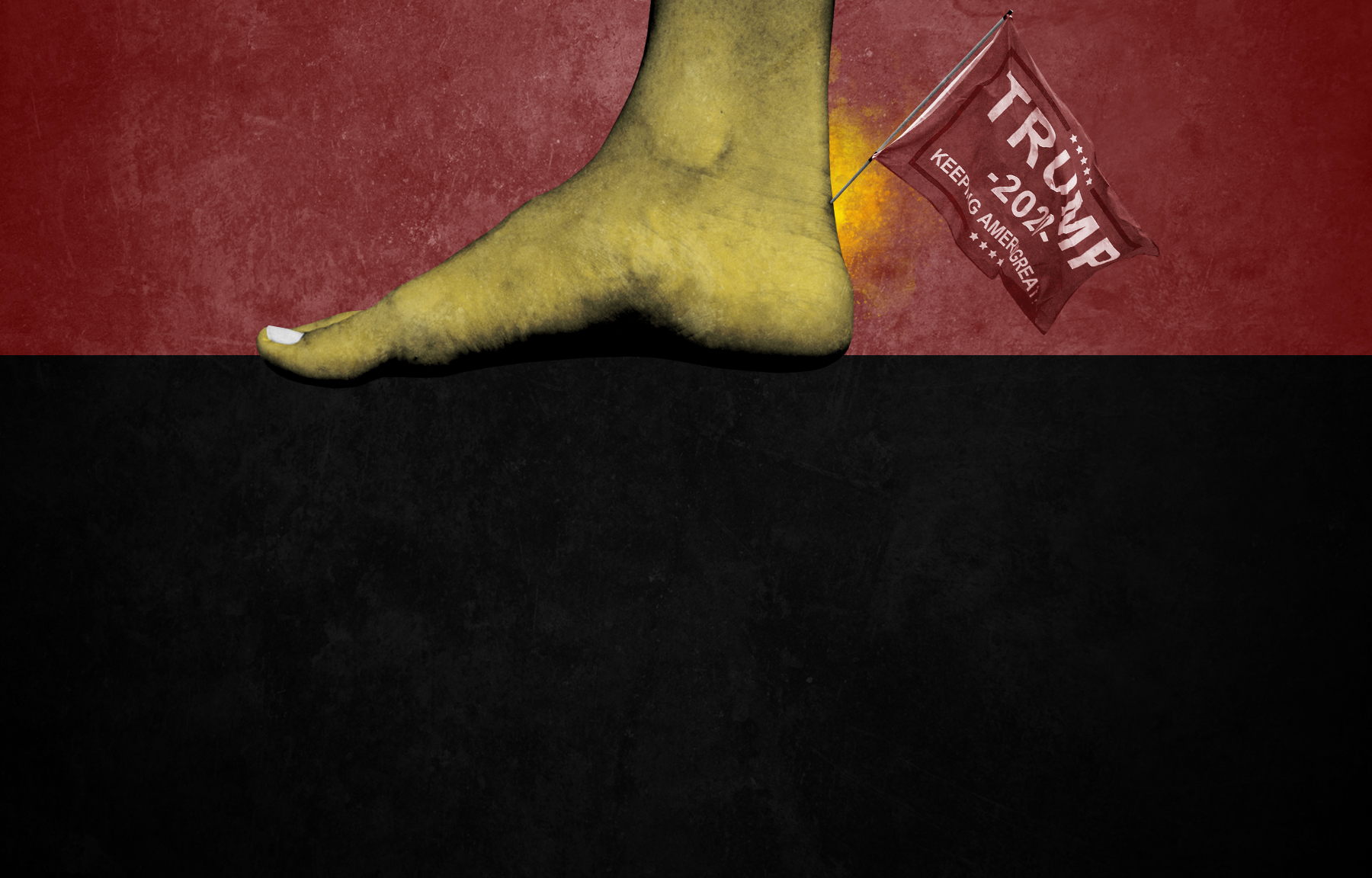Liberal democracy's Achilles Heel
How do you save a democracy from its own citizens?


Critics of liberal democracy have long accused it of being weak, more like a debating society obsessed with the fairness of its own rules than a vital force that can defend itself and triumph over hostile forms of politics and ways of life.
The historical record on this is mixed. On the positive side, liberal governments have an impressive track record against external enemies. France fell to Hitler's onslaught in 1940, but Great Britain stood its ground, and the United States worked in tandem with the Soviet Union to bring Nazi Germany and Imperial Japan to their knees. The Western powers, led by the U.S., then stood toe to toe against the Soviets and their allies for decades and ultimately prevailed.
But things are more muddled when it comes to liberal democracy's record against internal enemies. During the interwar period, liberal governments performed poorly in many cases, with liberalism in Germany, Italy, Spain, and other countries collapsing in the face of antiliberal challenges. More recently, numerous liberal democracies have seen right-wing “populist” movements and parties emerge. So far, those that have risen to power have done so through liberal institutions — and despite moves to rig the systems in their own favor (most boldly in Hungary and Poland), nowhere has liberal government been fully overturned in favor of outright authoritarian rule or worse.
Subscribe to The Week
Escape your echo chamber. Get the facts behind the news, plus analysis from multiple perspectives.

Sign up for The Week's Free Newsletters
From our morning news briefing to a weekly Good News Newsletter, get the best of The Week delivered directly to your inbox.
From our morning news briefing to a weekly Good News Newsletter, get the best of The Week delivered directly to your inbox.
But the United States presents a distinctive, and potentially ominous, case.
Over the past three months, the Republican Party has proven itself to be a right-wing antiliberal party. Yes, this has been the culmination of a long process. Yes, it has antecedents in the American past. Yes, there are still some decent people in the party trying to oppose the trend from within. But despite all of these caveats, what we've recently witnessed in the GOP is something new — and newly alarming.
Less than three months ago, the president and head of the Republican Party refused to concede the results of a free and fair election. He then spent more than two months doing everything in his power to delegitimize it with lies, including the assertion (without evidence) that he had in fact won in a landslide, with his rightful victory denied him by a massive conspiracy involving officials of his own party at the state and local levels, as well as a slew of state and federal judges, and most members of the mainstream media.
These lies ultimately incited an insurrection against Congress as it was attempting to certify the results of the election. If a few contingencies had unfolded differently on Jan. 6, members of Congress and senators might have been taken hostage and the vice president could well have ended up dead. Yet it looks increasingly unlikely that the now-former president will be convicted of incitement in a Senate trial — because so few Republicans are prepared to take a decisive stand against what he said and did in the aftermath of the 2020 election.
This means that the Republican Party is now dominated by ideas and individuals who consider it acceptable to reject the legitimacy of democratic elections when they deliver a loss, and to encourage, affirm, and spread outright lies in order to gain and hold political power. That makes the Republican Party a great danger to liberal democratic government in the United States.
But what can be done about it? How can we defend liberal democratic institutions and norms from those organizing against it? What weapons can liberalism deploy in its own defense?
The answer, unfortunately, is “not many.”
Liberalism is uniquely vulnerable to internal enemies because it is a form of government defined by its openness, its tolerance for dissent, its respect for and encouragement of pluralism. But this system can only sustain itself if everyone who enjoys these liberal freedoms remains committed to them as a principle that applies equally to all. Once some reject that principle of equality — holding, for example, that elections are only valid if they deliver victories to one of the country's two parties — a fundamental problem arises.
You might think that those attempting to defend the system would be justified in excluding those who reject openness, tolerance, pluralism, and the rules that enable their flourishing. But that very act of exclusion is itself an expression of illiberalism, which the dissenters will gladly use to accuse liberalism's defenders of hypocrisy and double standards.
That sounds like an accusation made in bad faith, and it likely will be in particular cases. But it's also, unfortunately, true. A liberal society really does become less liberal as it seeks to curtail the freedoms of those who would destroy it. Progressives recognized this tendency when it was the left that suffered during the red scare of the late 1940s and '50s. They may be less likely to recognize the problem today when the scrutiny is being directed at Trumpian conservatives. But the problem is the same.
This means that liberal democracy's very efforts to defend itself against its enemies can weaken it — leading it to diverge from its foundational principles and opening it up to justified criticism from the very same people who aim to tear it down.
We can see this dynamic at work today in post-Jan.6 efforts to take a stand against the right. This includes attempts to ban certain far-right figures from Facebook and Twitter, as well as the act of deplatforming Parler, a social-media site that had become a hotbed for right-wing incitement in the weeks leading up to the melee. Some have begun to propose going further, using regulatory power to restrict the reach of, or even shut down, Fox News.
Less fanciful have been debates about what to do about Donald Trump himself now that he's no longer president. In the days following the insurrection on Capitol Hill, it was reasonable for Twitter and Facebook to ban him, given the risk of him inciting further acts of violence surrounding the upcoming inauguration of Joe Biden. But what should happen now, with Trump a private citizen again? If he remains blocked, he and his supporters will be able to claim that tech companies are unfairly (illiberally and anti-democratically) penalizing him and the millions of Americans who view him as their tribune. But if these companies relent and allow him to start tweeting again, they've handed the leader of an anti-democratic insurrection the means of organizing and leading a new and more damaging putsch at some point in the future.
Liberal democracy needs to defend itself against those seeking to do it harm. Yet a country that shuts down media companies and enforces blacklists has in important respects ceased to be liberal. Which means that liberalism can weaken and even destroy itself in the very act of trying to defend itself. On the other hand, a liberalism that just stands back and upholds libertarian norms, outsourcing its self-defense to civil society's marketplace of ideas, can be suicidal. That's especially so when liberalism's opponents advance their ideas using an alternative set of facts that's impenetrable to rational criticism (because they're based on lies and unfalsifiable conspiracies).
Is there a solution to the riddle of liberalism's self-defense? A middle road between outright illiberalism and complacent disregard for the threat may be the best that we can hope for, along with efforts to bolster the popularity of politicians and parties who remain committed to liberal democratic institutions and norms.
In a recent essay in The Atlantic, Anne Applebaum suggests supplementing such efforts with attempts to engage with and deradicalize those Republicans who have followed Trump down the rabbit hole of lies, conspiracies, and sedition. This would involve trying to change the subject — setting aside political disagreements and disputes in favor of work on common projects to benefit the country, and perhaps especially the communities where many insurrectionists live.
It's unclear how much support there would be for such efforts, either among radicalized Republicans or among their political opponents. But Applebaum's ideas may nonetheless be the best alternative on offer — best not only because they're most likely to have a positive effect, but also because they're unlikely to clash with liberal democracy's own highest ideals.
Liberal politics only works when all participants freely choose to affirm and abide by liberal norms and rules. Aside from cases of outright lawbreaking, forcing obedience simply isn't a viable option. Which means that we need to embrace and encourage any effort, however much of a long shot it might be, to bring antiliberal Republicans back into the liberal fold.
A free daily email with the biggest news stories of the day – and the best features from TheWeek.com
Damon Linker is a senior correspondent at TheWeek.com. He is also a former contributing editor at The New Republic and the author of The Theocons and The Religious Test.
-
 Laura Lippman's 6 favorite books for those who crave a high-stakes adventure
Laura Lippman's 6 favorite books for those who crave a high-stakes adventureFeature The Grand Master recommends works by E.L. Konigsburg, Charles Portis, and more
-
 Book reviews: 'Bad Company: Private Equity and the Death of the American Dream' and 'Desi Arnaz: The Man Who Invented Television'
Book reviews: 'Bad Company: Private Equity and the Death of the American Dream' and 'Desi Arnaz: The Man Who Invented Television'Feature Private equity and the man who created 'I Love Lucy' get their close-ups
-
 Can Texas redistricting save the US House for the GOP?
Can Texas redistricting save the US House for the GOP?Today's Big Question Trump pushes a 'ruthless' new plan, but it could backfire
-
 The last words and final moments of 40 presidents
The last words and final moments of 40 presidentsThe Explainer Some are eloquent quotes worthy of the holders of the highest office in the nation, and others... aren't
-
 The JFK files: the truth at last?
The JFK files: the truth at last?In The Spotlight More than 64,000 previously classified documents relating the 1963 assassination of John F. Kennedy have been released by the Trump administration
-
 'Seriously, not literally': how should the world take Donald Trump?
'Seriously, not literally': how should the world take Donald Trump?Today's big question White House rhetoric and reality look likely to become increasingly blurred
-
 Will Trump's 'madman' strategy pay off?
Will Trump's 'madman' strategy pay off?Today's Big Question Incoming US president likes to seem unpredictable but, this time round, world leaders could be wise to his playbook
-
 Democrats vs. Republicans: which party are the billionaires backing?
Democrats vs. Republicans: which party are the billionaires backing?The Explainer Younger tech titans join 'boys' club throwing money and support' behind President Trump, while older plutocrats quietly rebuke new administration
-
 US election: where things stand with one week to go
US election: where things stand with one week to goThe Explainer Harris' lead in the polls has been narrowing in Trump's favour, but her campaign remains 'cautiously optimistic'
-
 Is Trump okay?
Is Trump okay?Today's Big Question Former president's mental fitness and alleged cognitive decline firmly back in the spotlight after 'bizarre' town hall event
-
 The life and times of Kamala Harris
The life and times of Kamala HarrisThe Explainer The vice-president is narrowly leading the race to become the next US president. How did she get to where she is now?
